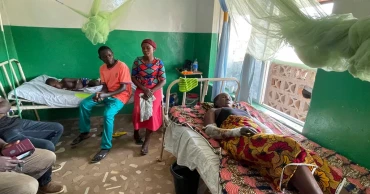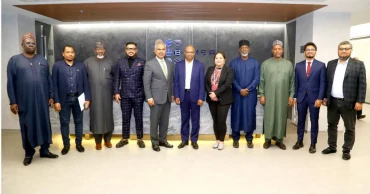Nigeria
Nigerian gasoline tanker explosion kills 70 people
At least 70 people have died in north-central Nigeria after a gasoline tanker exploded, the country’s emergency response agency said.
The blast happened in the early hours of Saturday near the Suleja area of Niger state after individuals attempted to transfer gasoline from one tanker into another truck using a generator.
The fuel transfer sparked the explosion, resulting in the deaths of those transferring the gasoline and bystanders, Hussaini Isah, of the National Emergency Management Agency, told the Associated Press.
Search and rescue operations were underway, Isah said.
With the absence of an efficient railway system to transport cargo, fatal truck accidents are common along most of the major roads in Nigeria, Africa’s most populous country.r
Read: Over 100 killed as gasoline tanker explodes in Nigeria
In September, an explosion killed at least 48 people in Niger state after gasoline tanker collided with another truck conveying cattle.
There were 1,531 gasoline tanker crashes in 2020 resulting in 535 fatalities and 1,142 injuries, according to Nigeria’s Federal Road Safety Corps.
1 year ago
Nigeria joins BRICS as a partner country
Nigeria has been accepted as a "partner country" of the BRICS group of emerging economies, as confirmed by Brazil, the current chair of the bloc, reports AP.
Established in 2009 by Brazil, Russia, India, and China, BRICS expanded in 2010 to include South Africa, positioning itself as a counterbalance to the Group of Seven leading industrialised nations.
Russia will help Vietnam to join BRICS bloc of developing nations
In the previous year, the bloc welcomed Iran, Egypt, Ethiopia, and the United Arab Emirates. Saudi Arabia has been extended an invitation to join, while Turkey, Azerbaijan, and Malaysia have submitted formal membership applications. Several other nations have also shown interest.
Nigeria is now the ninth partner country in BRICS, joining Belarus, Bolivia, Cuba, Kazakhstan, Malaysia, Thailand, Uganda, and Uzbekistan.
“With the world’s sixth-largest population, Africa’s largest, and as one of the continent’s leading economies, Nigeria shares aligned interests with other BRICS members,” Brazil’s government stated on Friday.
“It actively contributes to advancing South-South cooperation and reforming global governance, which are key priorities under Brazil’s current presidency.”
Indonesia becomes full member of BRICS
Last year, President-elect Donald Trump warned of imposing 100% tariffs on BRICS nations if they attempted to weaken the U.S. dollar. In response, BRICS leaders have reiterated their commitment to developing an alternative payment system independent of the dollar.
1 year ago
Gunmen kidnap some 50 people in Nigeria
Gunmen abducted at least 50 people, including women and children, in northwestern Nigeria's Zamfara state over the weekend, residents and police confirmed on Tuesday. The latest mass kidnapping highlights the ongoing insecurity in the region, where armed groups operate with little resistance.
The raid occurred in Maradun, lasting over two hours, according to community leader Halliru Attahiru, whose niece was among those taken. “Several women and small children were kidnapped,” Attahiru said, adding that authorities have yet to respond. Tasiu Hamisu, another resident, reported that gunmen targeted a house where 20 individuals were abducted, operating without any security interference.
Zamfara police spokesperson Yazid Abubakar confirmed the incident but did not provide further details. No group has claimed responsibility, but locals suspect the involvement of bandit groups known for mass kidnappings and ransom demands. These groups, often former herders in conflict with settled communities, have become a persistent threat in the conflict-prone northern region.
Kidnappings for ransom have surged in northwestern Nigeria, with armed groups exploiting weak security to target villages and travelers. Most victims are released after paying hefty ransoms. Earlier this year, more than 130 schoolchildren were freed after being held captive for over two weeks in neighboring Kaduna state.
Read: Over 100 killed as gasoline tanker explodes in Nigeria
The military has pledged to intensify efforts to combat insecurity in northern Nigeria, with Army Chief Olufemi Oluyede emphasizing renewed operations to address the crisis. However, the persistence of abductions, including the infamous 2014 Chibok schoolgirl kidnapping, underscores the scale of the challenge. Nearly 100 of the 276 girls abducted from Chibok remain in captivity a decade later.
Since then, over 1,500 students have been kidnapped, with armed groups using ransoms to fund other crimes and extend their influence in Nigeria's resource-rich but poorly secured northern regions.
Source: With inputs from agencies
1 year ago
Gasoline tanker explosion kills at least 90, injuries 50 in Nigeria
At least 90 people have died and 50 others have been injured following an explosion triggered by an overturned gasoline tanker in Nigeria, according to police reports.
The incident took place in Jigawa state shortly after midnight when the driver lost control of the tanker on a highway near a university.
Read: An explosion and fire at a service station in Russia's Chechnya kills 4
As locals rushed to collect fuel from the overturned vehicle, a sudden explosion ignited, resulting in a devastating fire that claimed 94 lives instantly, as stated by police spokesperson Lawan Adam.
1 year ago
In Nigeria’s hard-hit north, families seek justice as armed groups seek control
Christian Jonathan's mother was holding the 9-month-old boy in her arms when she was shot dead during an attack on their village in northwestern Nigeria. The assailants cut off one of Christian's finger and abandoned him by the side of the road with a bullet wound in his tiny leg.
"They left him on the ground beside his mother's body," said Joshua Jonathan, Christian's father. "They thought the boy was dead."
The late-night attack in April in Runji in Kaduna State left 33 people dead, most of them burned alive or shot dead. Many more have been killed since in the continuing clashes between nomadic cattle herders and farming communities in northwest and central regions of the West African nation, including more than 100 this month in Plateau state.
The decadeslong violence is becoming more deadly, killing at least 2,600 people in 2021, according to the most recent data from the Armed Conflict Location & Event Data Project. Once armed with sticks, the groups now fight with guns that have been smuggled into the country.
Both sides accuse the government of injustice and marginalization, but the clashes have also taken on a religious dimension, giving rise to militias that side with the herders, who are primarily Muslim, or the farmers from Christian communities.
The growing security crisis presents a huge challenge for Nigeria's incoming president, Bola Tinubu, who rose to power in Nigeria — Africa's largest economy and among its top oil producers — promising to improve the lives of affected communities and address the root causes of the crisis by providing jobs and ensuring justice. Tinubu's inauguration is scheduled for Monday.
If the violence isn't reined in, analysts say, it could further destabilize the country and drive more of its 216 million people into poverty. U.N. agencies say the violence affects mostly children, who are already threatened by malnutrition, and women, who are often abducted and forced into marriage.
The response of security forces can be slow and arrests are rare, prompting a growing number of communities to defend themselves when they come under siege.
"There is a substantial loss of confidence in the government as a protector of citizens," said Nnamdi Obasi, the senior adviser for Nigeria at the International Crisis Group. Obasi warned that the failure of the incoming administration to speedily resolve the conflict would lead to "more people seeking their own self-defense, more proliferation of weapons, more criminal groups and a rise in organized armed groups."
In Runji, an agrarian village, The Associated Press spoke to some survivors in hospital beds and others touring a mass grave and their razed houses. They said they were under attack for hours and that the gunmen fled long before security forces arrived.
Every household bears a scar.
Christopher Dauda's family was trying to escape when the gunmen caught up with his wife and four children, killing all five. Danjuma Joshua's two daughters were shot in the back while they tried to flee. In the home of Asabe Philip, who survived but has burns all over her body, the assailants burned five children alive as they cowered in one room.
Christian's aunt has tried to fill the void left by the killing of his mother. His father said Christian cries a lot and barely sleeps, although his physical wounds are gradually healing.
"We try to manage with what we have left," Joshua Jonathan said.
On the other side of the conflict, the herders say they are also under attack. They complain of cattle rustling and extrajudicial killings by local security groups working as community vigilantes.
Abdullahi Bello Bodejo, the president of the national herders' association, denied that anyone in the group was responsible for the violence. Most of the herders belong to the Fulanis, an ethnic group.
"Fulanis are not the killers. Any person carrying out killings is not our member. Sometimes, when communities accuse us of killings, 75% is not true; they have their own crisis but always blame Fulanis," said Bodejo.
Nigerian security forces say they have arrested dozens of gunmen and recovered their weapons. But the assailants are estimated to number in the thousands and can easily recruit new members, according to Abdulaziz Abdulaziz, a conflict researcher.
"There is a limit to the kinetic (military) operations, as it doesn't address the socioeconomic issue that gave rise to banditry in the region in the first place," said Oluwole Ojewale of the Africa-focused Institute of Security Studies. He said the incoming Tinubu administration must work with state governments to address unemployment, poverty and social injustice.
The recent violence has led to the formation of community, state and regional security outfits that experts say could create bigger problems for Nigeria's security architecture if not properly monitored.
And their recruits are young.
Felix Sunday, a college student in Kaduna, said that he was 16 when he joined a local vigilante group in 2021, and that he struggles to combine the night watch with his studies.
Across much of West and Central Africa, porous national borders facilitate the smuggling of weapons. A survey-based report published in 2021 by the Geneva-based Small Arms Survey in collaboration with the Nigerian government found that at least 6 million firearms may have been in the hands of civilians in the country at the time.
The military and police have recovered hundreds of firearms in Nigeria in the last year, but weapons dealers elsewhere are exacerbating the problem.
"Things have gotten considerably worse. Some are large military weapons imported from other countries," said Confidence MacHarry with the Lagos-based SBM Intelligence security firm.
With sophisticated weapons, the gunmen have launched daring attacks in areas with a heavy security presence, including a military base and an airport in Kaduna, indicating that the problem may be the motivation of the security forces themselves.
Survivors of the attack in Plateau told the AP that the police didn't arrive until the next day, echoing comments from people living in Runji, which has a security checkpoint nearby.
"When we call the soldiers, it is after the attackers have left that the soldiers come. Even if we hear they (the attackers) are coming and we report to the government, they don't take proactive action," said Simon Njam, a vigilante leader near Runji who uses bows, arrows and locally-made guns to secure the area.
Part of the problem is that the security forces are disorganized and unprepared to respond to the attacks, according to Kabir Adamu, the founder of Beacon Consulting, a security firm based in Nigeria's capital, Abuja.
"We don't have a coordinated security sector that identifies and counters threats," he said. "They need to work together to protect lives and currently, we are not seeing enough of that."
The Nigerian military and police didn't respond to written and phone inquiries seeking a response to the claims.
As more families mourn the loss of their loved ones, forced to replace farmland with graveyards, their priority is demanding justice.
"How can people just come and kill and nothing will happen?" asked Dauda in Runji, remembering his life with his wife and four children. "They cannot bring back my lost family, but the government can at least rebuild my home and ensure justice."
2 years ago
At least 30 people killed by gunmen in Nigeria attacks
At least 30 people were killed in an attack on an internally displaced person's camp in north-central Nigeria, the second major attack in the area this week, authorities said Saturday.
Gunmen attacked civilians in Mgban village in Benue state Friday evening and an investigation is underway, said Sewuese Anene, a local police officer.
While it's unclear who was responsible for the attack, authorities said suspicion fell on local herdsmen who have clashed in the past with farmers over land disputes in north-central Nigeria.
The farmers accuse the herders, mostly of Fulani origin, of grazing their livestock on their farms and destroying their produce. The herders insist that the lands are grazing routes that were first backed by law in 1965, five years after the country gained its independence.
The people attacked had been displaced from fighting between farmers and cattle herders and were seeking refuge in a makeshift displacement site.
The violence comes days after gunmen killed at least 50 people in two separate attacks on Umogidi village in the state, which is referred to as “Nigeria’s food basket” because of its bountiful harvests. The villages are some 170 kilometers (105 miles) away from Friday's attack, however, it's unclear if the same group was responsible for both attacks.
2 years ago
Nigeria's Bola Tinubu declared winner of presidential vote
Ruling party candidate Bola Tinubu was declared winner of Nigeria's presidential election early Wednesday, with the two leading opposition candidates already demanding a revote in Africa's most populous nation.
Election officials' overnight announcement was likely to lead to a court challenge by his main opponents Atiku Abubakar and Peter Obi. Abubakar also finished second in the last vote in 2019, then appealed those results before his lawsuit ultimately was dismissed.
On Tuesday, the two leading opposition parties had demanded a revote, saying that delays in uploading election results had made room for irregularities. The ruling All Progressives Congress party urged the opposition to accept defeat and not cause trouble.
Tinubu received 37% of the vote, or nearly 8.8 million, while main opposition candidate Abubakar won 29% with almost 7 million. Third-place finisher Obi took 25% with about 6.1 million, according to the results announced on live television by the Independent National Electoral Commission.
Also Read: Nigerian delegation discusses Dhaka-Abuja trade potential with BGMEA
Tinubu "having satisfied the requirements of the law, is hereby declared the winner and is returned elected,” said the country’s election chief, Mahmood Yakubu.
The announcement came after 4 a.m., but celebrations already had started late Tuesday at the ruling party’s national secretariat where Tinubu’s supporters had gathered in anticipation of his victory.
“None of the others matches his record!” said Babafemi Akin as he chatted excitedly about the prospects of a Tinubu administration. “I am sure he will do well.”
Tinubu, 70, is the former governor of Lagos state, home to Nigeria's megacity of the same name. However, he lost the state in Saturday's election to Obi, who drew a strong following among younger voters eager for change.
The parties now have three weeks to appeal results, but an election can be invalidated only if it's proven the national electoral body largely didn’t follow the law and acted in ways that could have changed the result.
The Supreme Court of Nigeria has never overturned a presidential election, though court challenges are common, including by outgoing President Muhammadu Buhari, who doggedly fought his past election losses for months in vain.
Nigeria’s presidential election has been closely watched as the country is not only the continent’s largest economy but it is also one of the continent’s top oil producers.
Observers have said Saturday’s election was mostly peaceful, though delays caused some voters to wait until the following day to cast their ballots. Many Nigerians had difficulties getting to their polling stations because of a currency redesign that resulted in a shortage of bank notes.
3 years ago
Nigerian delegation discusses Dhaka-Abuja trade potential with BGMEA
A delegation comprising high officials of different ministries of the Nigerian government paid a visit to Bangladesh Garment Manufacturers and Exporters Association (BGMEA) President Faruque Hassan in Dhaka Monday (January 16, 2023).
The delegation included Abubakar Aliyu Aziz, director general of the National Identity Management Commission, MaskaUbale Ahmed Shehi, executive commissioner of the Communications Commission, Alhassan Haru, director of Communications Commission, and Roberts Moses Achanya, president of the Nigeria-Bangladesh Trade and Technology Forum.
BGMEA Director Barrister Vidiya Amrit Khan, Bangladesh Knitwear Manufacturers and Exporters Association Vice-President Fazlee Shamim Ehsan and Fakir Fashion Managing Director Fakir Kamruzzaman Nahid were also present.
Read more: Bangladesh, Nigeria to explore possibility of signing framework agreement on FTA or PTA
They had discussions about possible areas of collaboration between Bangladesh and Nigeria for bilateral trade benefits, particularly in the apparel and textile industry.
Faruque said there is potential to import more cotton from Nigeria which is a cotton-producing nation. "Nigeria is also a potential market for Bangladesh's apparel export."
He called upon the Nigerian government to reduce import duty on readymade garments (RMG) from Bangladesh and requested cooperation from the delegation in this regard.
Read More: Bangladesh, Nigeria to explore possibility of signing framework agreement on FTA or PTA
3 years ago
Bangladesh, Nigeria to explore possibility of signing framework agreement on FTA or PTA
Bangladesh and Nigeria agreed to explore the possibility of signing a framework agreement on a free-trade agreement (FTA) or preferential trade agreement (PTA), the Foreign Ministry said Saturday.
The sides also agreed to consider signing an agreement between the apex chambers of the two countries and establishing cooperation in the IT and ICT sectors.
At the invitation of Foreign Minister AK Abdul Momen, a 17-member government and private sector delegation of Nigeria is in Dhaka now.
The Nigerian delegation, led by Communication and Digital Economy Minister Professor Isa Ali Ibrahim Pantami, comprises government representatives from the economic, trade and investment department, Communication and National Identity Management commissions, the education department, the High Commission of Nigeria in New Delhi, private sector representatives from the Nigeria-Bangladesh Trade and Technology Forum and businessmen.
Read more: Bangladesh, Nigeria to explore possibility of signing framework agreement on FTA or PTA
Pantami had a bilateral meeting with Commerce Minister Tipu Munshi today.
The commerce minister said mutual trade between Bangladesh and Nigeria is steadily growing and the Bangladesh government is making efforts to augment trade and commerce with Nigeria.
Tipu said there is a huge potential for cooperation in economic areas like manufacturing and garments industries.
He underlined the importance of more contacts among the chambers and businesses of the two countries and suggested the formation of a joint business council.
Pantami talked about Bangladesh's excellence in the IT and garments sectors.
Tipu sought continued support from the Nigerian government on the Rohingya issue as well as at different UN elections where Bangladesh has launched candidature.
He also urged the Nigerian government to set up a diplomatic mission in Dhaka.
Read more: Dhaka, Abuja agree to explore possibilities in contract farming, cooperation in agro, food processing
3 years ago
Over 50 feared dead in Nigeria church attack, officials say
Gunmen opened fire on worshippers and detonated explosives at a Catholic church in southwestern Nigeria on Sunday, leaving dozens feared dead, state lawmakers said.
The attackers targeted the St. Francis Catholic Church in Ondo state just as the worshippers gathered on Pentecost Sunday, legislator Ogunmolasuyi Oluwole said. Among the dead were many children, he said.
The presiding priest was abducted as well, said Adelegbe Timileyin, who represents the Owo area in Nigeria’s lower legislative chamber.
Also read:Children among 31 killed at church fair stampede in Nigeria
“Our hearts are heavy," Ondo Governor Rotimi Akeredolu tweeted Sunday. “Our peace and tranquility have been attacked by the enemies of the people.”
Authorities did not immediately release an official death toll. Timileyin said at least 50 people had been killed, though others put the figure higher. Videos appearing to be from the scene of the attack showed church worshippers lying in pools of blood while people around them wailed.
Nigerian President Muhammadu Buhari said “only fiends from the nether region could have conceived and carried out such dastardly act,” according to a statement from his spokesman.
“No matter what, this country shall never give in to evil and wicked people, and darkness will never overcome light. Nigeria will eventually win,” said Buhari, who was elected after vowing to end Nigeria’s prolonged security crisis.
In Rome, Pope Francis responded to news of the attack.
“The pope has learned of the attack on the church in Ondo, Nigeria and the deaths of dozens of worshippers, many children, during the celebration of Pentecost. While the details are being clarified, Pope Francis prays for the victims and the country, painfully affected at a time of celebration, and entrusts them both to the Lord so that he may send his spirit to console them,” the pope said in a statement issued by the Vatican press office.
Also read:Police say man shoots 2 females, self outside Iowa church
It was not immediately clear who was behind the attack on the church. While much of Nigeria has struggled with security issues, Ondo is widely known as one of Nigeria's most peaceful states. The state, though, has been caught up in a rising violent conflict between farmers and herders.
Nigeria's security forces did not immediately respond to questions about how the attack occurred or if there are any leads about suspects. Owo is about 345 kilometers (215 miles) east of Lagos.
“In the history of Owo, we have never experienced such an ugly incident," said lawmaker Oluwole. “This is too much.”
3 years ago


















